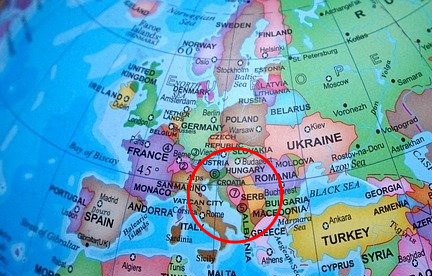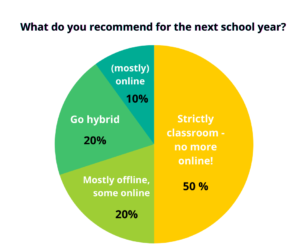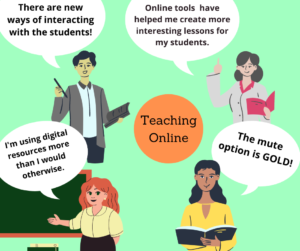It’s not a secret that ELTABB, despite being based in Berlin, is an international organization. So it’s only natural to ask, “How are teachers dealing with the online classroom as our new normal in other parts of the world?” Let’s find out – with a little help from Slobodan, one of our members from Bosnia.
It’s the end of June and teachers, students, schools and semesters are all slowly winding down. In the next school year, new adventures and challenges await them all.
Now, it goes without saying that the school year 2020/2021 is probably the strangest one in modern history. What will happen in the sphere of education starting September and the new school year, is anybody’s guess. A few days ago, a friend asked me about the conditions in schools and the mood in staff rooms in my region. I told her I’d look into it – here is what I found out:
Most teachers really want to be back behind the desk.
It wouldn’t make for very good reading if I stopped there; that’s why I’ll give you the whole story…
The Online Survey
So, to find out what teachers really think and how they feel about the situation, I decided to take advantage of online networking. I made a Google forms survey with some questions about experiences of:
- shifting to online lessons
- doing short(ened) lessons
- returning to the classroom and so on.
It didn’t seem enough to research only how people in my country felt.
That’s why I asked for help from my online connections – teachers in Bosnia and Herzegovina, Serbia, Montenegro and Croatia.
The Numbers Paint A Picture
After all being said and all questions being answered, this is what they think and how they feel:
- A decent 42% of the respondents is around the golden middle concerning the need to shift to online lessons during the previous schoolyear, with roughly 25% saying their students managed it well and they tried to make the online lessons a memorable experience;
- When it comes to the overall experience of teaching online, 10% said it was great and would do it again which is countered by 10% of respondents who said it was horrible and they wouldn’t repeat it; the rest is nested in the middle with a mild inclination toward the positive end of the scale – all in all, a positive response;
- During the (now previous) school year, all of the respondents did shorter lessons; the great majority doing 30-minute lessons instead of 45-minute lessons;
- Directly tied to the previous question, the majority (roughly 80%) would rather do short lessons in the future than go back to teaching their students online.
The Overall Result
The questionnaire finished with a strong 50% of respondents wanting 100% classroom work – nothing done online in the future at all; doing an occasional lesson online and having a hybrid approach with online collaboration activities got around 20% each, and 10% would like to keep on teaching fully or mostly online.
What Teachers Say About Teaching Online
Despite the number of online-enthusiasts being rather low, let’s not forget the comments given by the teachers as responses to the question of whether doing lessons online has brought any benefits to the teaching/learning process.
The most memorable ones include:
Happily Ever After?
What to say about all this? The overall impression is that most teachers went through a tough time and they weathered the storm but are not buying an umbrella for the future.
A few, however, are ready and willing to embrace this new medium through which so much already operates on a daily basis – as for which group will have the last laugh, only time will tell!
In the meantime, I am continuing to collect links and bookmarks for some useful online sites and/or services. How about you? What do you think? How much of “online” should be kept in education?
Give us your thoughts and ideas in the comments!
***










